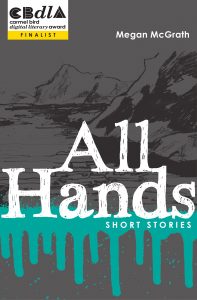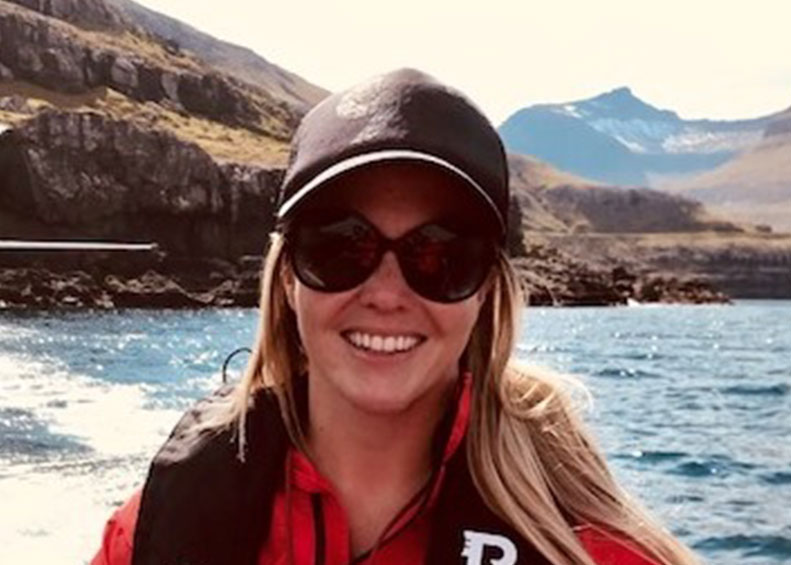In this post, Spineless Wonders’ editor Hannah Janssen interviews Megan McGrath about her debut collection, All Hands, about her writing practice and what she is currently reading.
- What is the most difficult part of the writing process for you?
My writing process is quite fluid and flexible. I usually start with an idea, draft an outline, then let the story and the characters bring it all together through the writing. I love the problem-solving element of creating fiction. When I come up against a plot point, or a scene that isn’t working, thinking my way through is probably my favourite part.
So what do I find most difficult? I put a lot of pressure on myself, which I’m sure most creators do. Keeping reality in check, being kind to myself and accepting that things don’t always go to plan (with projects, with submissions, with editing, with deadlines, with publications …) is the hardest part.
- Who are some of your favourite authors and what are you reading at the moment?
The short fiction of JG Ballard, Jhumpa Lahiri, Cate Kennedy, Tara June Winch, Steven Amsterdam, Julie Koh and Paul Theroux has greatly influenced my work. I like thoughtful writing, playful characters and scenes that resonate. For me, great first lines and endings that stay with you long after you finish reading are the best elements of short fiction (such as in Lahiri’s Going Ashore).
I’m a fiction reader, but my tastes vary from serious capital L literature like E. Annie Proulx and Ann Patchett to contemporary Australian novels like those by Emily Maguire, Robbie Arnott, Fiona Capp and Jock Serong. I have my guilty pleasures, too. I devour Liane Moriarty novels!
Right now I’m reading, and rereading, collections by local Brisbane short story writers. Amanda O’Callaghan’s new collection This Taste for Silence is a masterpiece and Laura Elvery’s Trick of the Light and Ellen van Neerven’s Heat and Light are stunning collections I revisit often.
3. Your Carmel Bird Digital Literary anthology is titled All Hands, the same as one of the stories contained within. Did this entry set the tone for the collection? How did you come to this decision?
The story title All Hands refers to the maritime term ‘all hands on deck’, a naval command that means everyone needs to pitch in, usually in a tough situation or an emergency. In the story with this title, it refers to a family rallying during a marriage breakdown.
I thought this title worked for the collection for two reasons: I liked the idea of my stories assembling to each pull their weight in the collection, and because each story presents an emergency of its own, calling the attention of the characters and (hopefully!) the reader.
- Much of your writing features the Australian coast as the narrative environment for your characters. Do you draw inspiration from a particular area or experience?
The Australian coastline presents a defining edge to things. In the collection, characters are pushed against or pulled towards the coastline. They are confronted by it, or find comfort in it. I’ve lived this way, too, as I’m from Minjerribah (North Stradbroke Island). The isolation, the power and the beauty, impacts those who exist at the edge of things.
Broome in Western Australia inspired the retreating tide in The Lunar Coast. The cliff-top dwelling in The Beachcombers is inspired by a place in my hometown. Tell-tale takes place in a fictional town, inspired by Newcastle NSW and Burleigh Heads in Queensland. The town in this story later developed into the setting for my novel The Big Catch.
- The ocean appears almost as another character in many of your stories, in particular The Breakers, where it is tied to an emotional admission from a daughter to her How do you connect with water, and what qualities do you see in it that inspires your story telling?
The ocean is like a character to me. It can be inviting and kind, but it can also turn on you when you least except it. I love the saying, never turn your back on the sea.
My experience being raised surrounded by water does fuel my fiction because I’ve known what these limits and boundaries can do to people and relationships, how the state of the ocean (and the winds and tides, too) can impact moods and change the dynamic of a situation, even subconsciously.
- When I read this collection I get a sense of many characters transforming their grief or loss into something resembling hope or self-development. Whether that be of something small like innocent hatchlings (Brother Bird), a relationship (All Hands), or the passing of a loved one (The Beachcombers). What would you say ties these stories together?
These are stories about mostly ordinary people facing ordinary challenges. But these challenges bring about a shift, whether that’s a shift in perspective or circumstance. Faced with change, these characters have the ability to flourish, or fail, or as you say, to transform. I think in real life, most people would choose to flourish. I think most people are capable of more than they give themselves credit for. My characters included. I like to think there is some element of, or the possibility for, hope and redemption in each of these stories. Even the ones that don’t have happy endings.
7. The collection seems to leave the time period ambiguous – there aren’t any concrete indicators of what year your characters are living in. Do you see this as an important feature of emotional storytelling?
This is definitely something I do to declutter a story. I like to play in a time that is much like ours now, maybe a little bit in the future, or a little bit in the past. There’s an excellent list of plots that could have been solved with a mobile phone (Romeo and Juliet, for example) so I try to limit the technology my characters have available. Stripping back pop culture and the political climate gives me a chance to really get to know the people I’m writing about, beyond those first date questions: what’s your favourite colour? What kind of music do you like? For me the only way to get to know someone in fiction (perhaps in real life, too) is to put them in a tough situation and see how they react. This is how people reveal themselves. Moment by moment. Who you are isn’t about who you vote for, or what you do with your spare time. It’s deeper than that.
- Where are you going from here? How has assembling this collection inspired your writing, and has it given you any ideas of what you will be exploring next? We can’t wait to read more from you!
Oh, thank you! That’s very kind.
I haven’t published any short fiction in years, because I’ve been working on novels, so revisiting the form has felt like coming home. I wrote some new work to round out the collection before submitting. I’ve definitely been inspired to persist with a few ideas I’d stashed in the ‘bottom drawer’.
In pulling this collection together I noticed I’ve used short stories to test out ideas that have gone into the novels I’ve been working on. I mentioned the setting in Tell-Tale. Eddie, from The Beachcombers became the main character of that same novel. He’s just a tender, but no longer stranded. In The Big Catch, a town out for revenge tests the bond of a husband and wife as they try to save their oyster-farming business and their marriage in the wake of an economic crash. I’m shopping this novel around at the moment and hope to find a home for it soon.
Likewise, the characters in Everything and Nothing feature in my novel-in-progress called Slip Point, a playful heist-novel about making your own luck, set at Rainbow Beach, which follows unlucky Leah who gets involved with a North Queensland con-artist while trying to repay her dead fiancé’s millennial debt.
I have one other idea I’ve been working on, but I’ve been told recently the plot won’t stand up as a novel. I’m a bit stubborn about letting the idea go, so perhaps this idea will become my next short story instead.
Thanks for the opportunity to talk about my writing and the collection. I hope readers enjoy All Hands as much as I enjoyed writing it!
All Hands is available as ebook and PDF, here.
MEGAN MCGRATH is from North Stradbroke Island in Queensland, Australia. She has written for the New York Times, Meanjin and Griffith Review. Her award-winning short fiction is published in literary journals and anthologies. Her recent work includes surf fiction for Tracks magazine, and the novella Whale Station. meganmcgraths.com

